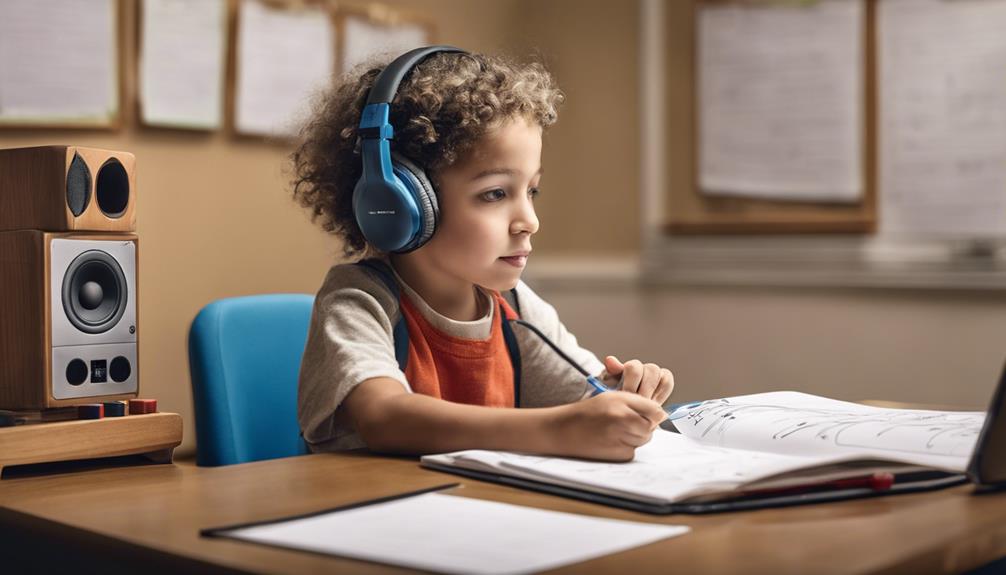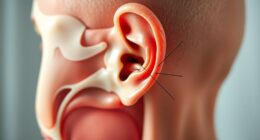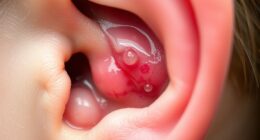When approaching Auditory Processing Assessment in Speech Therapy, we embark on a journey to uncover the intricacies of how individuals process auditory stimuli. From initial evaluations to tailored treatment plans, the path is paved with tests and techniques aimed at unraveling the mysteries of auditory processing abilities.
But what happens when these assessments reveal challenges? Join us as we explore the pivotal role these assessments play in shaping effective interventions and enhancing communication skills for those navigating auditory processing disorders.
Key Takeaways
- Specialized tests assess auditory discrimination, memory, and sequencing.
- Tailored treatment plans address communication and learning disorders.
- Collaboration with specialists enhances evaluation and intervention planning.
- Therapy interventions target specific processing challenges for improved communication skills.
Understanding Auditory Processing Assessment
Understanding how auditory processing assessment is conducted in speech therapy is crucial for identifying and addressing potential challenges in interpreting auditory information. During an auditory processing assessment, individuals are evaluated on their ability to process and make sense of auditory stimuli. Skills such as auditory discrimination, auditory memory, and auditory sequencing are assessed to determine how well the individual processes auditory information. This assessment is particularly important in identifying auditory processing disorders that may affect communication and learning abilities.
In speech therapy, auditory processing assessment results play a significant role in developing personalized treatment plans. These plans are tailored to improve the individual's auditory processing abilities based on the specific challenges identified during the assessment. Various tests, including word recognition, binaural integration, and temporal processing, may be utilized to pinpoint the exact areas of difficulty in auditory processing. By understanding the nuances of auditory processing assessment, speech therapists can effectively address and support individuals with auditory processing disorders in their journey towards improved communication skills.
Preliminary Evaluation Procedures

In the process of conducting auditory processing assessment in speech therapy, our preliminary evaluation procedures involve gathering comprehensive case history information to lay the foundation for further diagnostic evaluations. When assessing auditory processing disorders (APD), speech therapists employ various strategies to understand an individual's specific challenges. Here are three key components of our preliminary evaluation procedures:
- Detailed Case History: We meticulously collect information about the individual's hearing abilities, any past hearing-related issues, speech and language development, and academic performance to gain insight into their auditory processing capabilities.
- Observation of Behavior: Through observation, we assess how the individual responds to auditory stimuli, how they communicate in various settings, and their overall behavioral patterns related to auditory tasks.
- Informal Assessments: Utilizing informal tests, we gauge the individual's ability to process auditory information, such as following directions, distinguishing sounds, and comprehending speech in noisy environments. These assessments help us tailor further evaluations and interventions to address auditory processing difficulties effectively.
Speech Therapist's Role in Assessment
As speech therapists, we employ various evaluation methods to thoroughly assess auditory processing skills in our clients. By utilizing specialized tests, we can pinpoint areas such as:
- Auditory discrimination
- Temporal processing
- Memory
This comprehensive evaluation process allows us to collaborate effectively with the client's team and design tailored intervention plans for improving auditory processing abilities.
Therapist's Evaluation Methods
During auditory processing assessments in speech therapy, speech therapists employ various evaluation methods to gauge a client's ability to process and understand auditory information. Our evaluation methods focus on pinpointing specific auditory processing challenges and tailoring therapy interventions accordingly.
Here are three key approaches we use:
- Sound Discrimination Tasks: These tasks involve distinguishing between similar sounds to assess the client's ability to differentiate sounds accurately.
- Auditory Memory Assessments: By evaluating how well a client remembers auditory information, we can identify any challenges in retaining and recalling sounds.
- Interactive Activities Observation: Through interactive exercises, we observe how effectively clients process auditory information in real-time situations, providing valuable insights into their processing abilities.
Collaboration With Team
Our collaboration with the evaluation team in assessing auditory processing abilities involves providing essential insights on the child's communication challenges and actively engaging with audiologists and specialists.
As speech therapists, we play a crucial role in ensuring that the assessment addresses the specific communication difficulties related to auditory processing. By sharing our expertise in communication disorders, we enhance the evaluation process, focusing on auditory processing within the context of speech and language.
We contribute valuable information on the child's language skills and communication needs, which is essential for a comprehensive evaluation. Through effective collaboration with the evaluation team, we strive to create a holistic assessment that accurately identifies the child's auditory processing strengths and challenges, paving the way for tailored intervention strategies.
Communication Challenges Identification

As speech therapists, we meticulously observe and analyze behaviors to recognize speech difficulties and comprehend listening struggles in individuals.
Through specific auditory processing tests, we assess binaural integration, temporal processing, spatial processing, and auditory discrimination to pinpoint areas of communication challenges.
This evaluation process is crucial for tailoring interventions and designing effective strategies to improve auditory processing skills in our clients.
Recognizing Speech Difficulties
Recognizing speech difficulties in children involves keen observation of behaviors such as frequent requests for repetition or mishearing words, providing valuable insights into potential communication challenges. When dealing with auditory processing disorders, central auditory processing disorder, or other speech difficulties in children and adults, speech therapists play a crucial role in assessment and intervention.
Here are three key points to consider when recognizing speech difficulties:
- Observing Communication Patterns: Pay attention to how a child interacts in different settings to identify patterns in their speech and language challenges.
- Noticing Repetitive Behaviors: Look for repetitive behaviors like asking for words to be repeated frequently, which could indicate underlying speech difficulties.
- Misunderstanding Instructions: Children struggling with speech may have difficulty following instructions accurately, highlighting potential communication challenges that need addressing promptly.
Understanding Listening Struggles
Listening struggles in children can be early indicators of potential auditory processing challenges, impacting their comprehension of spoken information. Communication challenges, such as difficulty following instructions or processing speech, may signal the need for an auditory processing assessment. Identifying listening difficulties early is crucial as it can lead to appropriate interventions and support for children with auditory processing issues. Behaviors like asking for repetition, mishearing words, or being easily distracted could be signs of underlying auditory processing challenges. An auditory processing assessment in speech therapy can help pinpoint specific areas of difficulty and guide personalized intervention strategies.
| Auditory Processing | Listening Difficulties | Communication Challenges | Intervention Strategies |
|---|---|---|---|
| Identifying issues with processing auditory information. | Struggles in understanding spoken information. | Difficulty following instructions or processing speech. | Tailored support and interventions to address auditory processing challenges. |
Diagnostic Tools and Techniques

Commonly utilized in auditory processing assessments in speech therapy are diagnostic tools such as the SCAN-3: A and the Gaps-In-Noise test. These tools help speech therapists evaluate various aspects of auditory processing abilities to identify deficits and plan appropriate intervention strategies.
In addition to these tests, techniques like speech-in-noise testing and dichotic listening tasks are frequently employed to gain a comprehensive understanding of an individual's auditory processing skills. Electrophysiological measures such as Auditory Brainstem Response (ABR) or cortical auditory evoked potentials may also be utilized for a more detailed assessment.
Key Points:
- Diagnostic Tools: SCAN-3: A and Gaps-In-Noise test.
- Techniques: Speech-in-noise testing and dichotic listening tasks.
- Additional Measures: Electrophysiological evaluations like ABR or cortical auditory evoked potentials.
Interpretation of Assessment Results

Upon analyzing the results of auditory processing tests, we can pinpoint specific weaknesses in processing auditory information that inform the development of tailored therapy plans. Interpretation of assessment results is crucial in identifying difficulties such as binaural integration, temporal processing, spatial processing, and auditory discrimination.
These results offer valuable insights into the individual's auditory processing abilities and challenges, guiding us in creating individualized therapy plans. By conducting a detailed analysis of assessment outcomes, we can target specific areas for improvement, ensuring that therapy strategies are focused and effective.
Understanding the nuances of auditory processing through assessment results allows us to tailor interventions to address the unique needs of each individual, fostering optimal progress and outcomes in speech therapy. Through this interpretation, we can create a roadmap for therapy that's personalized and targeted, maximizing the potential for improvement in auditory processing skills.
Collaborative Treatment Planning

In our collaborative approach to treatment planning for auditory processing assessment, speech therapists, audiologists, and specialists engage in communication to develop tailored therapy goals and interventions based on the assessment findings. This collaborative effort ensures a comprehensive and individualized approach to addressing auditory processing weaknesses.
Here are three key components of our collaborative treatment planning process:
- Individualized Goals: By pooling our expertise, we craft specific therapy goals that target the unique auditory processing challenges identified in the assessment.
- Tailored Interventions: Working together, we design interventions that are customized to improve listening skills and enhance overall auditory processing abilities for each individual.
- Comprehensive Approach: Our collaborative efforts guarantee that every aspect of auditory processing disorder management is addressed, leading to a more effective and holistic treatment plan.
Through ongoing communication and cooperation, we strive to provide the best possible outcomes for individuals undergoing auditory processing assessment and therapy.
Frequently Asked Questions
What Does an Auditory Processing Evaluation Consist Of?
An auditory processing evaluation consists of a battery of tests that assess various auditory processing skills, including binaural integration, temporal processing, spatial processing, and auditory discrimination.
These tests are tailored to the individual's age, concerns, and cognitive abilities.
Prior to central auditory processing tests, a peripheral audiological evaluation is usually conducted.
Observational checklists and a comprehensive case history play crucial roles in the evaluation process.
Can a Speech Therapist Test for Auditory Processing Disorder?
Yes, we can test for auditory processing disorder. Our assessments involve various standardized tests to evaluate auditory processing abilities. Through observation and assessment, we can identify signs of APD.
If needed, we may recommend further evaluation by an audiologist. Our evaluations provide valuable insights into how auditory processing impacts communication skills, helping us tailor our therapy to best support individuals with APD.
What Is Auditory Processing Speech Therapy?
Auditory processing speech therapy enhances the ability to interpret auditory information like speech sounds and language. Therapists employ specialized techniques to improve listening, comprehension, and communication skills.
Tailored exercises and activities target individual needs and goals. It aims to address challenges in recognizing speech sounds, understanding language, and following verbal instructions.
The therapy assists individuals with auditory processing difficulties in developing crucial auditory processing skills.
What Are the Assessment Tools for Auditory Processing Disorder?
When assessing auditory processing disorder, various tools like the SCAN-3: C, Gaps-In-Noise test, speech-in-noise testing, Frequency Pattern Test, and Staggered Spondaic Word test are commonly used.
These assessments help evaluate auditory processing skills, temporal processing abilities, speech understanding in noise, auditory discrimination, pattern recognition, and binaural integration.
Each test provides valuable insights into an individual's auditory processing strengths and weaknesses, guiding effective intervention strategies in speech therapy.
Conclusion
In conclusion, undergoing an auditory processing assessment in speech therapy can provide valuable insights into our listening abilities and communication challenges. By working with a licensed audiologist, we can uncover any underlying auditory processing disorders and develop tailored treatment plans to enhance our overall auditory processing skills.
This assessment is a crucial step in improving our ability to comprehend and process auditory information, paving the way for clearer communication and enhanced listening capabilities. It's like unlocking the key to a whole new world of sound!











